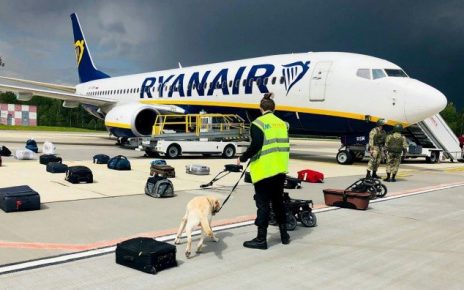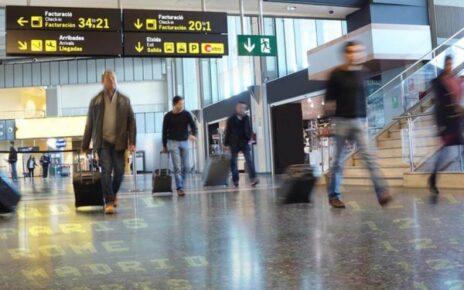When the buck stops here, and you are the here, how do you handle a ruthless entity like COVID-19 and all its ramifications on your airline that have been going on for over a year now?
- With the current quarter at 10% of 2019 seat levels, how does the CEO see the coming months and quarters?
- Airline restrictions make it confusing for customers on one hand and tremendously challenging for operators to work in an environment that is remotely reminiscent of anything normal.
- With the government coming out with a plan on how to unwind restrictions, Lundgren says they can look forward to a good summer because this is not a question about demand; it is all about the restrictions in place.
In an interview with Johan Lundgren, easyJet CEO, Jonathan Wober of CAPA Live interviews the chief executive on the current state of affairs in the world dealing with COVID-19 and the effects it has had on the aviation industry in general and on easyJet in particular.
Jonathan Wober:
Good morning. It’s my great pleasure to welcome the chief executive of easyJet, Johan Lundgren, who joined the company, I think, three years ago now. What a time you’ve had to face Johan. I’m just going to start off by asking a slightly off-the-wall question. I read, according to my research, you started life as a trombonist, so I guess you’ve swapped one kind of metal tube for another. I was wondering if there was any relevance at all in that early career to your career in travel.
Johan Lundgren:
Oh, that’s a good question. I haven’t had that one. Is there any relevance to the… No, I think that I was very determined from quite a young age that I wanted to become a solo trombonist, and nobody told me really about the fact that there isn’t a lot of demand out there for trombone soloists, so the demand and supply, it wasn’t really something that I was quite well informed for, and look, I wasn’t talented enough. Then, I decided to go into travel because I love to travel, and I love people, so it sounded to me like a great idea. Then, I worked myself through in various positions within the travel and hospitality industry, which has been all my working life now.
Jonathan Wober:
Yeah. I guess the demand for a solo trombonist is still even lower than the demand for air travel, even though it’s very depressed, currently. Bringing us onto air travel, just to find out a bit more about your current levels of activity, you’ve said, recently, that the current quarter is 10% of 2019 seat levels. The December quarter, I think, you were at about 18% of 2019 seat levels and only 13% of passenger numbers. With this 10% of capacity that you’ve got in the current quarter, what passenger level do you expect? Then, more importantly, I think, because everybody knows we’re in a lockdown, how do you see it progressing in the coming months and quarters?
Johan Lundgren:
Yeah, you’re right. I mean, we’re saying that we’re not estimated to fly more than 10% in the quarter that we are in compared to the 2019 levels. The issue is, though, that the travel sentiment, it’s so much depending on the daily news flow. Then, also, the biggest thing now we have is, of course, the restrictions that are in place to control the pandemic. One of the difficulties that everyone has to face when you’re in this industry is the fact that these restrictions look very different depending on the jurisdiction, which makes it very confusing for our customers on one hand and tremendously challenging for the operators to operate in anything that reminds you of normal circumstances.
So, we have to be tremendously flexible in terms of our capacity planning, but the volumes are very, very small, and the volumes that are there are primarily domestic flying. There’s very little international flying there in the first place. We didn’t estimate that there was going to be a huge amount of flying in this quarter when we saw where this was happening prior to Christmas, but most important now is that the government’s comes out with a plan on how they’re going to unwind these restrictions that are in place, so we can look forward to a good summer because we know that there is underlying demand out there. This is not a question about demand. This is all about the restrictions that are in place. That is, of course, a consequence of the pandemic, which we completely understand is the first and foremost of the priorities here.
Jonathan Wober:
Eurocontrol, the network manager, recently put out some traffic scenarios suggesting that, even by June, traffic in terms of numbers of flights, but it’s not that different to seat numbers, would be down by between 55% and 70% on 2019 levels even by June. If we’re still talking about considerably reduced flights at that stage, I mean, where do you see it going after June? Are we going to get back to… We’re not going to get back to 2019, but where do you think you might get back to in the best-case scenario?
Johan Lundgren:
Look, I think that there’s a number of scenarios out there, but let’s be very clear. Nobody knows. Nobody knows if it’s going to be more or less than some of the stats you’re mentioning. Of course, it’s interesting to look at the scenarios, and some of them are based on some underlying assumptions that could well be true, but the fact is that this could change in a few weeks’ time. If it is a continuation of a successful rollout of the vaccination program, is starting to have a better effect than perhaps anticipated, restrictions could be lifted earlier. Then, I think it’s going to… can be an absolute boom on travel because it’s such an underlying, pent-up demand that is out there, but the thing is that nobody knows what even this is going to look like in a week’s time, never mind what this is going to be in June.
But I’m positive for a strong summer if the vaccination programs are successful, if it works on the variants, if it works on the mutations that is out there, then we know that there’s a big urgent need for the government to unwind these restrictions. Mind you, also, that there are many, many countries out there who are very dependent on tourism, so this is one of the priorities that they have in a safe way to get flying and travel going again. I think we can be very positively surprised if there is a positive continuation of the program of the vaccinations.
Jonathan Wober:
Well, I guess the two-sided coin for people like you, because you’re Pan-European, you operate in many countries, but so you have more opportunity than airlines that are really focused on primarily flying out of one country, but you also have to face a greater level of uncertainty in the different governments’ attitudes towards all of this. The travel restrictions have never been very coordinated at all. The progress of vaccination is on a different timeframe in different countries, and even if you’ve made great progress with vaccination, countries may decide to keep traveling restrictions because other countries haven’t made the same progress. How do you even begin to plan your network in that kind of situation?
Johan Lundgren:
Well, we know that, for instance, if there are big variances between countries, and there will be restrictions that are tighter and harder in one country from another, the beauty of having an airline is, actually, you can move your assets. You can fly to different places. You can fly to where demand is. I think it’s fair to say that the early indications of the demand that we’re seeing for the summer is into the big, traditional holiday resorts, where people recognize that there’s an infrastructure in place and so on, but if international borders are being closed, well, then it’s going to be much more focused on domestic, as an example. I mean, once in all, you could see… Like I said, it’s a scenario.
It doesn’t mean that it’s perhaps likely to happen is that you can see a very, very strong domestic flying. If you’re taking a look at what we already do today, out of that 10%, and up to 10% we talked about in the quarter, that is primarily UK domestic, France domestic, and domestic in Italy. Very little goes international. Of course, if one country feels that they are now in control of this but decides to have restrictions in from international travel, well, that’s going to be reflected in the program. So, we have done a number of these scenarios, and we want to wait as long as we possibly can before we start operating them, and putting them on sale, and getting the crew in, and start looking at the capacities versus that demand as long as we can get the latest information to the restrictions because it is the restrictions that are really, really the key here.




